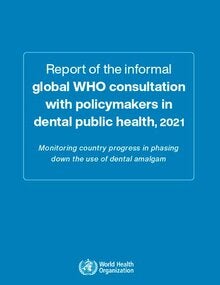Overview
Despite advances in modern dentistry, untreated dental caries in permanent teeth was reported as one the most prevalent conditions assessed in the 2019 Global Burden of Disease study. The restorative model for managing dental caries was developed in the 1900s, with dental amalgam as one of the restorative materials. The Minamata Convention on Mercury (2013) is an international legally-binding treaty that aims to protect human health and the environment from anthropogenic emissions and releases of mercury and mercury compounds. The Convention addresses products that include mercury, including dental amalgam (made of approximately 50% elemental mercury by weight) and proposes nine measures to phase down the use of dental amalgam. In 2021, WHO organized an informal consultation with policymakers in the field of dental public health to better understand progress in phasing down the use of dental amalgam at global, regional, and national levels. This report describes the results of the consultation, which aimed to: understand the extent of implementation of the nine phase-down measures; gather knowledge of the use of mercury-free alternatives to dental amalgam; and to identify additional measures being implemented to phase down the use of dental amalgam.
|

